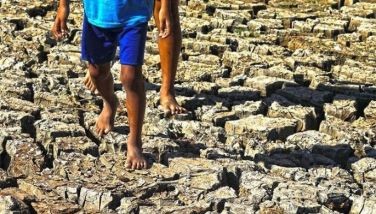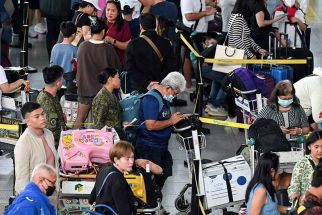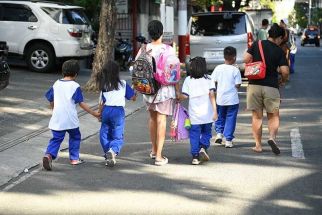International meet on conflict prevention concludes
March 11, 2005 | 12:00am
Peace for the people, by the people.
An international conference seeking to formally bring civil society into the peacemaking process concluded yesterday, but the work of formalizing the involvement of non-government organizations (NGOs), people’s organizations and other civil society groups in the prevention of armed conflict has barely begun.
The Global Partnership for the Prevention of Armed Conflict (GPPAC) conference brought together representatives from the Philippines, Indonesia, Malaysia, New Zealand, Cambodia and Myanmar — most of them people who have brokered peace at the community level in conflict areas. The conference, held at Bayview Hotel and De La Salle University in Manila, was dubbed the "People’s Participation in Conflict Prevention in Southeast Asia: The Role of Civil Society."
According to Initiatives for International Dialogues (IID) executive director Augusto Miclat, the initiatives for linking peacemaking efforts by civil society and government "have not gone very far."
Despite this, GPPAC seeks to work towards providing civil society with a voice and working links with the United Nations and continues to "hammer away" at gaining linkages between governments and civil society groups.
According to conference keynote speaker sociologist Mary Racelis of the Ateneo de Manila University (AdMU) Institute of Philippine Culture, the concept of civil society is linked to "the notion of minimizing violence in social relations (and) the public use of reason as a way of managing human affairs in place of submission based on fear and insecurity."
According to her, the efforts of GPPAC and its affiliated civil society groups seek to find "a way of addressing the problem of war, of debating, arguing about, discussing and pressing for possible solutions or alternatives."
Civil society groups affiliated with GPPAC are seeking representation, or at least a working linkage with the UN, she said, "because these groups feel that their governments are not doing enough" to make peace in areas of armed conflict.
Racelis said "these groups feel that their government is not representative of them or their interests," as in the case of Myanmar, where reports of human rights violations – including gang-rapes and rape-slays of ethnic women – are rife.
"We need resources to make this initiative flourish, for people to be aware (of this initiative) even among us in civil society before we can effectively lobby government," Miclat said. "We are taking the first steps towards this."
As it stands, GPPAC has already made some headway. While the group is not formally recognized by the United Nations General Assembly, Racelis is on UN Secretary-General Kofi Annan’s panel of eminent persons on UN-Civil Society Relations.
Racelis said that, for the first time in the history of the UN Security Council, civil society was allowed to directly address the UNSC last year, when the Philippines chaired the council.
The GPPAC conference, Racelis said, seeks to promote a humanitarian alternative to war and push forward humanitarian norms that the international community has a duty to prevent genocide, violations of humanitarian law "as in war crimes," and massive violations of human rights, "as in crimes against humanity."
"Outside of the GPPAC process, there have been many experiences already bilaterally, locally and regionally, on engaging the government and the UN on issues regarding conflict prevention," Miclat said.
Many efforts at the grass-roots level, Racelis said, have been effective. Most of these methods are traditional "such as in Somalia, where the women are the ones who work to prevent inter-clan conflicts."
In the Philippines, Miclat said, many people’s groups have worked to prevent conflicts, particularly in areas where there are blood feuds and festering conflicts.
The mechanisms that the GPPAC conference proposes to utilize with help from the UN and governments are "already in place," he said. These efforts may be combined with conflict prevention moves made by bigger, established authorities to make for lasting peace "if we institutionalize the process," Miclat said.
While he conceded that "there are already existing conflicts, what we seek to address is (preventing) further conflicts or escalations of existing conflicts and trying to shift the prevailing paradigm or mindset from reaction to conflicts to prevention."
It is with the goal of institutionalizing such a mindset that the GPPAC is working to be heard by governments and international bodies like the UN and the Association of Southeast Asian Nations (ASEAN).
In the global setting, civil society "offers a way of understanding the process of globalization in terms of subjective human agency instead of a disembodied deterministic process of ‘interconnectedness,’" Racelis said.
To her, global alliances need to place "more emphasis on horizontal relationships among equals; stronger links between local, national and global action; and a more democratic way of deciding on strategy and messages."
In this area, she added, information technology and the Internet allow "networks with less centralized structures," such as civil society groups, to interact in a more fluid and proactive manner than "flatter hierarchies," such as governments.
However, while this effort to bring civil society formally into the peacemaking process is underway, Miclat said the United States-led war on terrorism threatens the process.
The war on terror, he said, "is impacting hugely in the region." He added that the international anti-terrorism campaign "can be problematic" for the ASEAN, because the term terrorism has not been universally defined and agreed upon.
The war on terrorism, he said, has blurred the lines between groups fighting an oppressive government and bandit or terrorist groups.
He also posed these questions: "How does one distinguish between terrorism and armed struggle? Is there a difference between state terror and terrorism by non-state actors? Are struggles for national liberation acts of terrorism?"
Miclat said, "We believe that, in overcoming oppression and repression, non-violent approaches are far more effective than terrorism. But we also challenge the conditions that will foster terrorism – including poverty, injustice or inequalities, exploitation, political repression and neocolonialism. Conflict prevention in this sense means addressing the roots of terrorism."
An international conference seeking to formally bring civil society into the peacemaking process concluded yesterday, but the work of formalizing the involvement of non-government organizations (NGOs), people’s organizations and other civil society groups in the prevention of armed conflict has barely begun.
The Global Partnership for the Prevention of Armed Conflict (GPPAC) conference brought together representatives from the Philippines, Indonesia, Malaysia, New Zealand, Cambodia and Myanmar — most of them people who have brokered peace at the community level in conflict areas. The conference, held at Bayview Hotel and De La Salle University in Manila, was dubbed the "People’s Participation in Conflict Prevention in Southeast Asia: The Role of Civil Society."
According to Initiatives for International Dialogues (IID) executive director Augusto Miclat, the initiatives for linking peacemaking efforts by civil society and government "have not gone very far."
Despite this, GPPAC seeks to work towards providing civil society with a voice and working links with the United Nations and continues to "hammer away" at gaining linkages between governments and civil society groups.
According to conference keynote speaker sociologist Mary Racelis of the Ateneo de Manila University (AdMU) Institute of Philippine Culture, the concept of civil society is linked to "the notion of minimizing violence in social relations (and) the public use of reason as a way of managing human affairs in place of submission based on fear and insecurity."
According to her, the efforts of GPPAC and its affiliated civil society groups seek to find "a way of addressing the problem of war, of debating, arguing about, discussing and pressing for possible solutions or alternatives."
Civil society groups affiliated with GPPAC are seeking representation, or at least a working linkage with the UN, she said, "because these groups feel that their governments are not doing enough" to make peace in areas of armed conflict.
Racelis said "these groups feel that their government is not representative of them or their interests," as in the case of Myanmar, where reports of human rights violations – including gang-rapes and rape-slays of ethnic women – are rife.
"We need resources to make this initiative flourish, for people to be aware (of this initiative) even among us in civil society before we can effectively lobby government," Miclat said. "We are taking the first steps towards this."
As it stands, GPPAC has already made some headway. While the group is not formally recognized by the United Nations General Assembly, Racelis is on UN Secretary-General Kofi Annan’s panel of eminent persons on UN-Civil Society Relations.
Racelis said that, for the first time in the history of the UN Security Council, civil society was allowed to directly address the UNSC last year, when the Philippines chaired the council.
The GPPAC conference, Racelis said, seeks to promote a humanitarian alternative to war and push forward humanitarian norms that the international community has a duty to prevent genocide, violations of humanitarian law "as in war crimes," and massive violations of human rights, "as in crimes against humanity."
"Outside of the GPPAC process, there have been many experiences already bilaterally, locally and regionally, on engaging the government and the UN on issues regarding conflict prevention," Miclat said.
Many efforts at the grass-roots level, Racelis said, have been effective. Most of these methods are traditional "such as in Somalia, where the women are the ones who work to prevent inter-clan conflicts."
In the Philippines, Miclat said, many people’s groups have worked to prevent conflicts, particularly in areas where there are blood feuds and festering conflicts.
The mechanisms that the GPPAC conference proposes to utilize with help from the UN and governments are "already in place," he said. These efforts may be combined with conflict prevention moves made by bigger, established authorities to make for lasting peace "if we institutionalize the process," Miclat said.
While he conceded that "there are already existing conflicts, what we seek to address is (preventing) further conflicts or escalations of existing conflicts and trying to shift the prevailing paradigm or mindset from reaction to conflicts to prevention."
It is with the goal of institutionalizing such a mindset that the GPPAC is working to be heard by governments and international bodies like the UN and the Association of Southeast Asian Nations (ASEAN).
In the global setting, civil society "offers a way of understanding the process of globalization in terms of subjective human agency instead of a disembodied deterministic process of ‘interconnectedness,’" Racelis said.
To her, global alliances need to place "more emphasis on horizontal relationships among equals; stronger links between local, national and global action; and a more democratic way of deciding on strategy and messages."
In this area, she added, information technology and the Internet allow "networks with less centralized structures," such as civil society groups, to interact in a more fluid and proactive manner than "flatter hierarchies," such as governments.
However, while this effort to bring civil society formally into the peacemaking process is underway, Miclat said the United States-led war on terrorism threatens the process.
The war on terror, he said, "is impacting hugely in the region." He added that the international anti-terrorism campaign "can be problematic" for the ASEAN, because the term terrorism has not been universally defined and agreed upon.
The war on terrorism, he said, has blurred the lines between groups fighting an oppressive government and bandit or terrorist groups.
He also posed these questions: "How does one distinguish between terrorism and armed struggle? Is there a difference between state terror and terrorism by non-state actors? Are struggles for national liberation acts of terrorism?"
Miclat said, "We believe that, in overcoming oppression and repression, non-violent approaches are far more effective than terrorism. But we also challenge the conditions that will foster terrorism – including poverty, injustice or inequalities, exploitation, political repression and neocolonialism. Conflict prevention in this sense means addressing the roots of terrorism."
BrandSpace Articles
<
>
- Latest
- Trending
Trending
Latest
Trending
Latest
Recommended




























